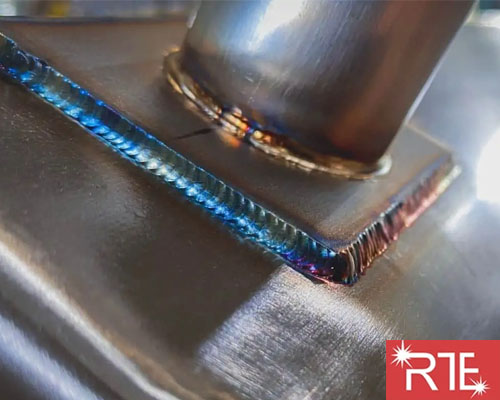Tig Welder Service in Chennai
Tig Welder Service in Chennai–Royal Tech Engineering is a Top most handpicked Tig Welder Service, Get best price for Tig welding service.
Tig Welder Service in Chennai – Royal Tech Engineering is Use TIG welding in high-tech, high-impact industries like automotive and aerospace because of its ability to produce strong, quality welds on thin materials. Since the operator has manual control over the filler metal, the beads can be much smaller and cause less disruption in the surrounding metal.
The Principle Of TIG Welding
Tungsten Inert Gas (TIG) welding uses the heat generated by an electric arc struck between a non-consumable tungsten electrode and the workpiece to fuse metal in the joint area and produce a molten weld pool.
TIG machine controls
TIG machines use a foot-operated variable amperage control. After the maximum amperage desired is pre-set on the machine, this allows you to vary the amperage up to the maximum pre-set amperage. This is useful when TIG welding alloy steels, such as 4130 chrome-moly. The foot control allows you to slowly initiate the heat, and after the weld is complete you can slowly reduce the heat. This soft start and soft stop prevents temperature shocking the metal. Many alloy steels used in race cars are sensitive to thermal shock. Welding by other means may lead to brittle welds.
TIG Machine Reduce Heat Into The Workpiece
A TIG machine has numerous controls. One of the most vital controls for welding aluminum is balance, which maintains the cleaning versus penetration levels on aluminum. The higher the balance, the more penetration you’ll get. Typical settings range from 70 to 80 percent, or 7-8.
You can also select normal or pulsed mode. When using pulsed mode on aluminum, the amperage is automatically varied. This can reduce the heat into the workpiece and help you achieve a better weld, as well as reduce the heat-affected zone. Pulsing automatically produces a stacked dimes look or a rippled wave pattern in the weld.
FAQ’S?
What does laser marking do?
Laser marking can mark a variety of materials such as steel, aluminum, stainless steel, polymers, and rubber.
Is laser marking permanent?
In simplest terms, laser marking is a permanent process that uses a beam of concentrated light to create a lasting mark on a surface. Typically performed with a fiber, pulsed, continuous wave, green, or UV laser machine, laser marking encompasses a wide variety of applications.
How is laser cutting priced?
The laser cutting costs are based on the time your file takes to cut in the laser.
How deep is laser marking?
When it comes to deep engraving, the depth can easily reach a few millimeters into metals.
How fast is laser marking?
Laser marking machines have always been considered very fast devices at various marking speeds, but they also have limitations. The theoretical speed of the manufacturer is 9000mm/s, and some marking opportunities are lower than this speed, about 7000mm/s.
Can laser engraving fade?
Soft metals such as copper, brass and aluminium are more prone to engraving fading than harder metals such as stainless steel and other materials. For glass engraving, the quality of the glass will affect longevity.







